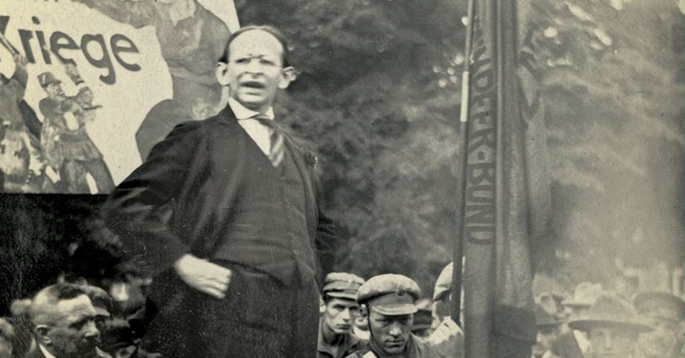“We’re not just meshuga [crazy] students.” This assertion came from Ruth Fischer, the young leader of the left opposition in the Communist Party of Germany (KPD), in early 1923. The trademark of the KPD left in the 1920s was its rejection of any compromise with the Social Democrats. Instead, they called for permanent offensives and revolutionary purity—and were reviled as petty bourgeois salon socialists.
Biographies have been written about Fischer (in German) as well as her comrade-in-arms and companion Arkadi Maslow (also in German). The third figure in the triumvirate of Germany’s communist left, the organizer Werner Scholem, however, remained in obscurity. Only because of his brother—the historian Gershom Scholem, friend to Walter Benjamin—is his name still known. The young Berlin historian Ralf Hoffrogge is a specialist in forgotten figures of the revolutionary workers’ movement in Germany. Now he presents the first biography of Scholem.
From Zionism to Socialism
As a young man, Scholem broke with Zionism—which inspired his brother till the end of his life—and joined the socialist youth movement. Radicalized by the First World War, he joined the Independent Social Democratic Party of Germany (USPD) and in 1920 went along with the majority of its members into the United Communist Party (VKPD).
Scholem joined the left wing of the KPD, which had its stronghold in the Berlin-Brandenburg region, and soon became its most important organizer. Clara Zetkin, a gray eminence of German communism, despised the left opposition for its mixture of “cynical brashness” and “muddleheaded impudence”—from Zetkin’s point of view, these people had nothing to do with the working masses.
Fischer, Maslow and Scholem were certainly all young intellectuals from Jewish families of the middle bourgeoisie. But Hoffrogge shows that industrial workers—including the revolutionary stewards, who had played a leading role in the November Revolution of 1918—occupied equally important roles in the KPD left.
After the “German October” in 1923 was defeated without a struggle, the Communist International planned to renew the KPD leadership. But behind the scenes, Scholem organized meetings throughout the country in favor of the left wing. In April 1924, the left—as if riding on an avalanche—was able to take over the entire party leadership.
The 28-year-old Scholem became the Orgleiter (organizational leader) at the party headquarters in the Rosenthaler Straße 38 (only two years later the KPD bought its much more famous headquarters, the Karl Liebknecht House, a few blocks away). As the head of the party center with nine departments—including M (military) and N (intelligence service)—Scholem had “almost unlimited control over the apparatus,” in the words of historian Hermann Weber, and made all decisions about personnel, from the typist to the editor-in-chief, sometimes even including mandates in the Reichstag (parliament).
Bolshevization
Scholem was criticized for being the “party executioner” because he was not squeamish in his dealings with supporters of the former leadership. As the head of the “Bolshevization” campaign, he restricted democracy within the party, yet he soon became a victim of a new phenomenon: the increasingly powerful Stalinism bureaucracy in the communist movement. By November 1926, Scholem was expelled from the party after initiating the “Declaration of the 700” in solidarity with the Left Opposition in the Soviet Union.
His concerned mother wrote about her son: “Werner does have a talent for getting caught between two stools.” “Compromise” was a taboo word for him. Scholem participated in oppositional communist groups, but he resigned from the Leninbund in 1928 when it ran candidates in an election, against the KPD. He was expelled from his political home, but Scholem remained true to his communist views.
Rumors claimed that Scholem had seduced Marie-Louise von Hammerstein, the daughter of a general, in order to acquire a speech that Hitler gave to the Wehrmacht leadership for the KPD intelligence service. Several historical novels have been published about this story (including one by Maslow)—but as Hoffrogge can convincingly prove, Scholem indeed had nothing to do with this impressively successful espionage operation.
In 1933, Scholem was taken into “protective custody”—for the Nazis he was the perfect example of Jewish Bolshevism. “Goebbels needs to keep a couple of Jews on hand in order to demonstrate that he has stamped out bolshevism,” said Gershom. In 1940, Scholem was shot. His life remained in obscurity for a long time.
Ralf Hoffrogge, A Jewish Communist in Weimar Germany: The Life of Werner Scholem (1895-1940) (Chicago: Haymarket, 2018).











